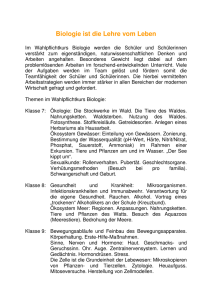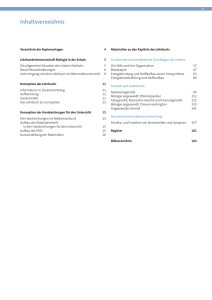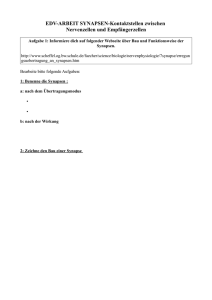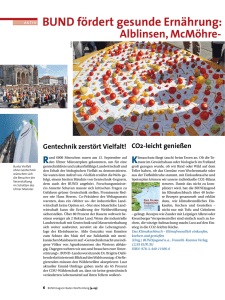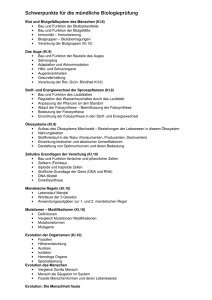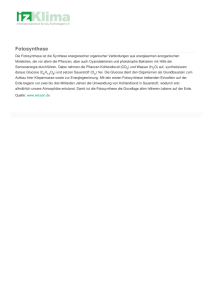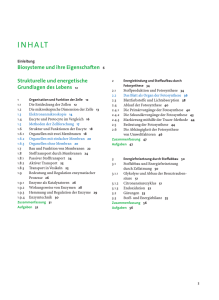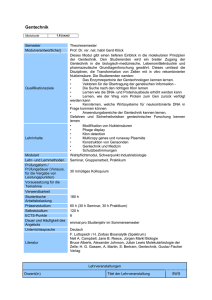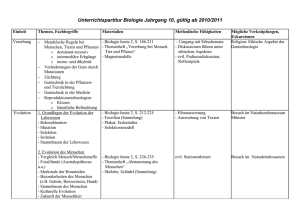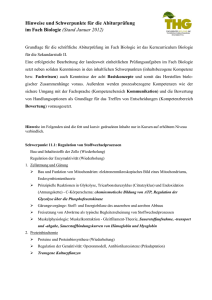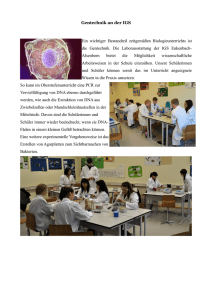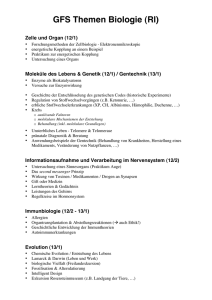Inhalt - STARK Verlag
Werbung
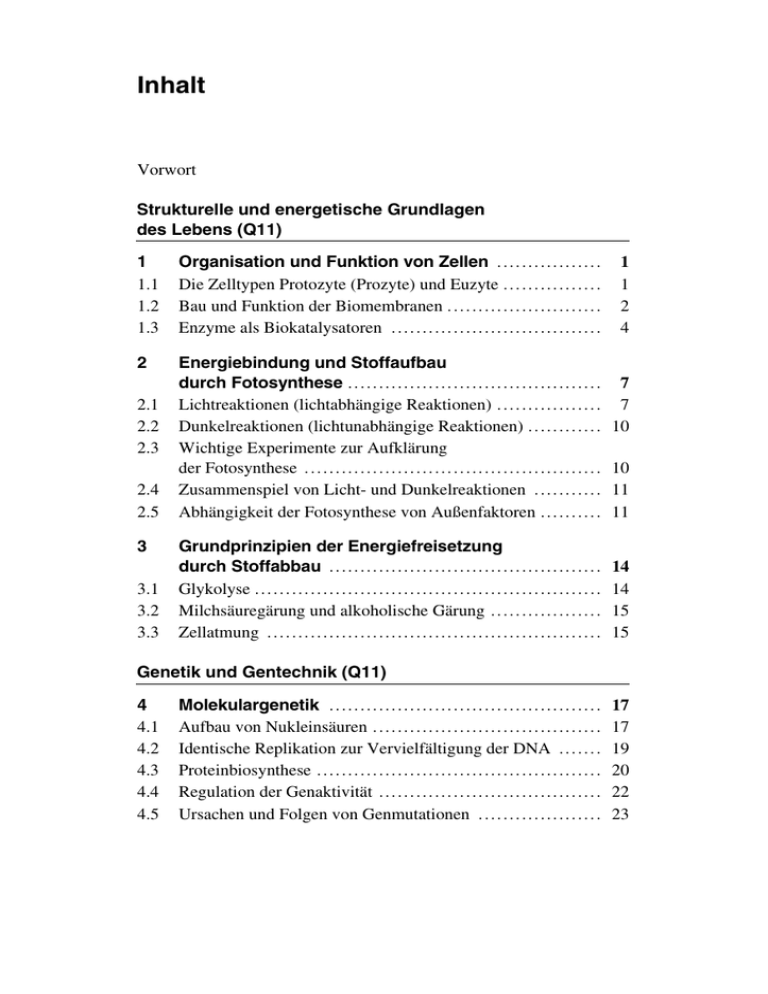
Inhalt Vorwort Strukturelle und energetische Grundlagen des Lebens (Q11) 1 1.1 1.2 1.3 Organisation und Funktion von Zellen . . . . . . . . . . . . . . . . . Die Zelltypen Protozyte (Prozyte) und Euzyte . . . . . . . . . . . . . . . . Bau und Funktion der Biomembranen . . . . . . . . . . . . . . . . . . . . . . . . . Enzyme als Biokatalysatoren . . . . . . . . . . . . . . . . . . . . . . . . . . . . . . . . . . 2 Energiebindung und Stoffaufbau durch Fotosynthese . . . . . . . . . . . . . . . . . . . . . . . . . . . . . . . . . . . . . . . . . Lichtreaktionen (lichtabhängige Reaktionen) . . . . . . . . . . . . . . . . . Dunkelreaktionen (lichtunabhängige Reaktionen) . . . . . . . . . . . . Wichtige Experimente zur Aufklärung der Fotosynthese . . . . . . . . . . . . . . . . . . . . . . . . . . . . . . . . . . . . . . . . . . . . . . . . Zusammenspiel von Licht- und Dunkelreaktionen . . . . . . . . . . . Abhängigkeit der Fotosynthese von Außenfaktoren . . . . . . . . . . 2.1 2.2 2.3 2.4 2.5 3 3.1 3.2 3.3 Grundprinzipien der Energiefreisetzung durch Stoffabbau . . . . . . . . . . . . . . . . . . . . . . . . . . . . . . . . . . . . . . . . . . . . Glykolyse . . . . . . . . . . . . . . . . . . . . . . . . . . . . . . . . . . . . . . . . . . . . . . . . . . . . . . . . Milchsäuregärung und alkoholische Gärung . . . . . . . . . . . . . . . . . . Zellatmung . . . . . . . . . . . . . . . . . . . . . . . . . . . . . . . . . . . . . . . . . . . . . . . . . . . . . . 1 1 2 4 7 7 10 10 11 11 14 14 15 15 Genetik und Gentechnik (Q11) 4 4.1 4.2 4.3 4.4 4.5 Molekulargenetik . . . . . . . . . . . . . . . . . . . . . . . . . . . . . . . . . . . . . . . . . . . . Aufbau von Nukleinsäuren . . . . . . . . . . . . . . . . . . . . . . . . . . . . . . . . . . . . . Identische Replikation zur Vervielfältigung der DNA . . . . . . . Proteinbiosynthese . . . . . . . . . . . . . . . . . . . . . . . . . . . . . . . . . . . . . . . . . . . . . . Regulation der Genaktivität . . . . . . . . . . . . . . . . . . . . . . . . . . . . . . . . . . . . Ursachen und Folgen von Genmutationen . . . . . . . . . . . . . . . . . . . . 17 17 19 20 22 23 5 5.1 5.2 5.3 5.4 Zytogenetik . . . . . . . . . . . . . . . . . . . . . . . . . . . . . . . . . . . . . . . . . . . . . . . . . . . Bau der Chromosomen . . . . . . . . . . . . . . . . . . . . . . . . . . . . . . . . . . . . . . . . . Zellzyklus . . . . . . . . . . . . . . . . . . . . . . . . . . . . . . . . . . . . . . . . . . . . . . . . . . . . . . . Meiose . . . . . . . . . . . . . . . . . . . . . . . . . . . . . . . . . . . . . . . . . . . . . . . . . . . . . . . . . . . Numerische Chromosomenaberrationen beim Menschen . . . . . . . . . . . . . . . . . . . . . . . . . . . . . . . . . . . . . . . . . . . . . . . . . 24 24 25 26 6 6.1 6.2 6.3 Klassische Genetik . . . . . . . . . . . . . . . . . . . . . . . . . . . . . . . . . . . . . . . . . . Die Mendelschen Regeln . . . . . . . . . . . . . . . . . . . . . . . . . . . . . . . . . . . . . . . Genkopplung und Genaustausch . . . . . . . . . . . . . . . . . . . . . . . . . . . . . . . Additive Polygenie . . . . . . . . . . . . . . . . . . . . . . . . . . . . . . . . . . . . . . . . . . . . . 31 31 34 34 7 7.1 7.2 7.3 Humangenetik . . . . . . . . . . . . . . . . . . . . . . . . . . . . . . . . . . . . . . . . . . . . . . . . Vererbung der Blutgruppen beim Menschen . . . . . . . . . . . . . . . . . . Erbgänge von Erbkrankheiten beim Menschen . . . . . . . . . . . . . . . Genetische Familienberatung und pränatale Diagnostik . . . . . 35 35 36 39 8 8.1 8.2 8.3 Gentechnik . . . . . . . . . . . . . . . . . . . . . . . . . . . . . . . . . . . . . . . . . . . . . . . . . . . . Grundlegende Methoden in der Gentechnik . . . . . . . . . . . . . . . . . . Spezielle Verfahren . . . . . . . . . . . . . . . . . . . . . . . . . . . . . . . . . . . . . . . . . . . . . Anwendungen der Gentechnik . . . . . . . . . . . . . . . . . . . . . . . . . . . . . . . . . 40 40 42 43 29 Der Mensch als Umweltfaktor (Q11) 9 9.1 9.2 9.3 Populationsdynamik . . . . . . . . . . . . . . . . . . . . . . . . . . . . . . . . . . . . . . . . Idealisiertes und reales Wachstum einer Population . . . . . . . . . Einfluss von Umweltfaktoren auf die Populationsdichte . . . . . Bedeutung verschiedener Fortpflanzungsstrategien . . . . . . . . . . 45 45 46 48 10 Biodiversität . . . . . . . . . . . . . . . . . . . . . . . . . . . . . . . . . . . . . . . . . . . . . . . . . . 48 10.1 Anthropogene Einflüsse auf die Artenvielfalt . . . . . . . . . . . . . . . . 49 10.2 Bedeutung der Biodiversität . . . . . . . . . . . . . . . . . . . . . . . . . . . . . . . . . . . 50 Evolution (Q12) 11 Evolutionsforschung . . . . . . . . . . . . . . . . . . . . . . . . . . . . . . . . . . . . . . . 51 11.1 Entwicklung des Evolutionsgedankens . . . . . . . . . . . . . . . . . . . . . . . . 51 11.2 Homologien zur Rekonstruktion stammesgeschichtlicher Verwandtschaft . . . . . . . . . . . . . . . . . . . . . . 53 12 12.1 12.2 12.3 12.4 Mechanismen der Evolution . . . . . . . . . . . . . . . . . . . . . . . . . . . . . . Mutation und Rekombination . . . . . . . . . . . . . . . . . . . . . . . . . . . . . . . . . . Selektion als richtender Evolutionsfaktor . . . . . . . . . . . . . . . . . . . . . Gendrift als Zufallsfaktor . . . . . . . . . . . . . . . . . . . . . . . . . . . . . . . . . . . . . . Rassen- und Artbildung durch Isolation . . . . . . . . . . . . . . . . . . . . . . . 55 56 56 59 60 13 13.1 13.2 13.3 Evolutionsprozesse . . . . . . . . . . . . . . . . . . . . . . . . . . . . . . . . . . . . . . . . . Entwicklung des Lebens auf der Erde . . . . . . . . . . . . . . . . . . . . . . . . . Evolutionsschübe nach Massenaussterben . . . . . . . . . . . . . . . . . . . . Koevolution . . . . . . . . . . . . . . . . . . . . . . . . . . . . . . . . . . . . . . . . . . . . . . . . . . . . . 62 62 64 65 14 14.1 14.2 14.3 Evolution des Menschen . . . . . . . . . . . . . . . . . . . . . . . . . . . . . . . . . . . Stellung des Menschen im natürlichen System . . . . . . . . . . . . . . . Mensch und Menschenaffen im Vergleich . . . . . . . . . . . . . . . . . . . . Stammesgeschichtliche Entwicklung zum Homo sapiens . . . . . . . . . . . . . . . . . . . . . . . . . . . . . . . . . . . . . . . . . . . . . . . . . . . 66 66 66 67 Neuronale Informationsverarbeitung (Q12) 15 15.1 15.2 15.3 15.4 Elektrochemische Vorgänge in Nervenzellen . . . . . . . . . Bau und grundlegende Funktion einer Nervenzelle . . . . . . . . . . Ruhepotenzial . . . . . . . . . . . . . . . . . . . . . . . . . . . . . . . . . . . . . . . . . . . . . . . . . . . Aktionspotenzial . . . . . . . . . . . . . . . . . . . . . . . . . . . . . . . . . . . . . . . . . . . . . . . . Erregungsleitung im Axon . . . . . . . . . . . . . . . . . . . . . . . . . . . . . . . . . . . . . Erregungsübertragung an einer chemischen Synapse . . . . . . . . . . . . . . . . . . . . . . . . . . . . . . . . . . . . . . . 16.1 Bau und Funktion einer neuromuskulären Synapse . . . . . . . . . . 16.2 Erregende und hemmende Synapsen zwischen Neuronen . . . . . . . . . . . . . . . . . . . . . . . . . . . . . . . . . . . . . . . . . . . . . 16.3 Wirkung von Giften und Drogen an Synapsen . . . . . . . . . . . . . . . . 69 69 70 72 73 16 75 75 76 77 Verhaltensbiologie (Q12) 17 17.1 17.2 17.3 Genetisch bedingte Verhaltensweisen . . . . . . . . . . . . . . . . . Unbedingte Reflexe . . . . . . . . . . . . . . . . . . . . . . . . . . . . . . . . . . . . . . . . . . . . . Instinkthandlungen . . . . . . . . . . . . . . . . . . . . . . . . . . . . . . . . . . . . . . . . . . . . . Experimentelle Hinweise auf erbbedingtes Verhalten . . . . . . . . 79 79 80 82 18 Erweiterung einfacher Verhaltensweisen durch Lerneinflüsse . . . . . . . . . . . . . . . . . . . . . . . . . . . . . . . . . . . . . . . . . 18.1 Prägungen . . . . . . . . . . . . . . . . . . . . . . . . . . . . . . . . . . . . . . . . . . . . . . . . . . . . . . . 18.2 Reizbedingte (klassische) Konditionierungen . . . . . . . . . . . . . . . . 18.3 Verhaltensbedingte (operante oder instrumentelle) Konditionierungen . . . . . . . . . . . . . . . . . . . . . . . . . . . . . . . . . . . . . . . . . . . . . . 19 19.1 19.2 19.3 19.4 Individuum und soziale Gruppe . . . . . . . . . . . . . . . . . . . . . . . . . . Kooperation . . . . . . . . . . . . . . . . . . . . . . . . . . . . . . . . . . . . . . . . . . . . . . . . . . . . . Kommunikation . . . . . . . . . . . . . . . . . . . . . . . . . . . . . . . . . . . . . . . . . . . . . . . . . Aggressionsverhalten . . . . . . . . . . . . . . . . . . . . . . . . . . . . . . . . . . . . . . . . . . . Sexualverhalten . . . . . . . . . . . . . . . . . . . . . . . . . . . . . . . . . . . . . . . . . . . . . . . . . 83 83 84 85 86 86 88 90 91 Stichwortverzeichnis . . . . . . . . . . . . . . . . . . . . . . . . . . . . . . . . . . . . . . . . . . . . . . . . . . 95 Autorin: Brigitte Meinhard
